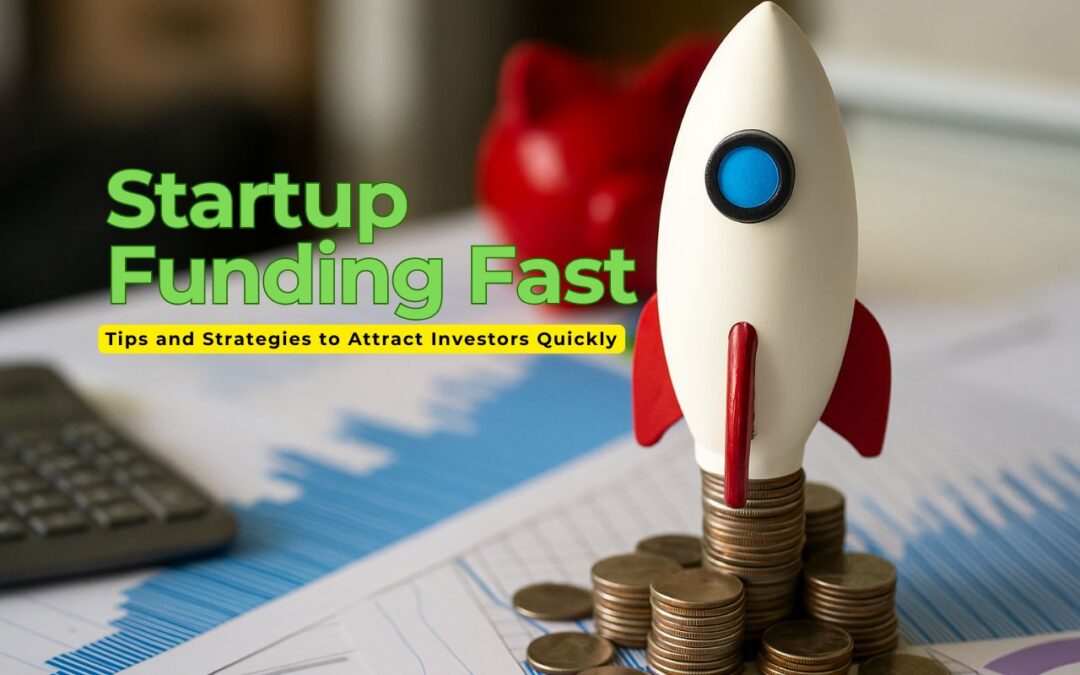Launching a startup is a thrilling journey—one filled with innovation, ambition, and a vision for change. But turning your idea into a thriving business requires more than just passion. It needs capital. One of the biggest hurdles many founders face is getting investors on board quickly. Whether you’re building the next tech unicorn or launching a purpose-driven venture, securing funding at the right time can make or break your momentum.
In this blog, we’ll explore practical, human-centered strategies to help you attract investors swiftly without sacrificing your vision or values. This guide goes beyond generic advice and focuses on actionable, real-world tactics that can accelerate your fundraising journey.
Understand What Investors Really Want
Before reaching out to potential investors, it’s essential to understand their mindset. Investors are not merely looking to support interesting ideas—they’re looking for strong returns on their investments. This means you need to demonstrate not just creativity, but also business viability, scalability, and leadership.
At the core, investors want to know:
- Can this business make money?
- Is the market big enough to support growth?
- Is the team capable of executing the vision?
- Is there a clear plan for growth and exit?
Answering these questions in your pitch, pitch deck, and conversations can dramatically increase your chances of securing funding.
Start with a Solid Business Foundation
Investors are more likely to engage with startups that appear professional and prepared. That means:
- Defining your mission, vision, and value proposition clearly.
- Understanding your target audience and competition.
- Having a well-thought-out business model and go-to-market strategy.
- Demonstrating early traction, even if minimal, such as beta users or product interest.
- Preparing financial projections that are realistic and data-informed.
If you’re missing any of these components, take the time to build them first. A solid foundation not only boosts credibility but also shows you’re serious about making your startup succeed.
Build a Compelling Story Around Your Startup
Numbers are important, but stories inspire action. Investors are drawn to compelling narratives that paint a vivid picture of the problem you’re solving and how your startup will transform the industry or community.
Craft your story by:
- Identifying a personal or relatable origin story for your idea.
- Highlighting the urgency or pain point that your product addresses.
- Showing how your unique approach offers a breakthrough.
- Demonstrating how your team is uniquely positioned to succeed.
An emotionally resonant and logically sound story creates a connection. It makes you memorable in a sea of pitch decks.
Create an Irresistible Pitch Deck
Your pitch deck is often your first impression. It must capture attention and communicate your value quickly. Ensure it is clean, easy to follow, and no longer than necessary.
A strong pitch deck usually includes:
- Introduction and problem
- Solution and product overview
- Market opportunity
- Business model
- Go-to-market strategy
- Competitive analysis
- Traction and milestones
- Financial projections
- Team
- Ask (how much funding and what for)
Keep it visually appealing but don’t let design overshadow clarity. You’re selling your vision—make every slide count.
Leverage Warm Introductions Whenever Possible
One of the fastest ways to get an investor’s attention is through a trusted introduction. Cold emails can work, but warm introductions are more effective because they come with built-in credibility.
Here’s how to tap into your network:
- Reach out to mentors, former colleagues, alumni, or advisors.
- Attend founder or investor meetups and pitch events.
- Let people know you’re fundraising and ask them to connect you with potential investors.
- Participate in startup accelerator programs and entrepreneur communities.
Every conversation is an opportunity. Be transparent, authentic, and persistent without being pushy.
Get Investment-Ready: Due Diligence Preparation
Fast investment doesn’t mean skipping the details. Investors will still do their homework, even on short timelines. Make sure your startup is investment-ready by preparing:
- Legal documents (like incorporation, equity structure, founder agreements)
- Financial reports and projections
- Market research or user data
- Any intellectual property, if applicable
Having these ready when asked signals professionalism and builds trust quickly.
Use the Power of Scarcity and Urgency
Human psychology plays a big role in fundraising. Investors, like most people, are motivated by opportunities that feel urgent and scarce. If you can ethically create momentum and show that others are interested, you’re more likely to close deals quickly.
Some strategies to create urgency:
- Mention (honestly) that you’re closing a round soon.
- Share updates about others committing or showing interest.
- Set a specific deadline for this investment round.
- Present this as a limited-time opportunity to get in early.
But never bluff. Integrity matters. Investors will know if you’re being inauthentic—and that can backfire.
Show Early Wins and Customer Validation
Nothing attracts investment like proof that your startup is already solving problems for real people. Even small wins can be powerful. For instance:
- Positive feedback from early users or pilot testers
- Letters of intent or partnership discussions
- Pre-orders or subscriptions
- Testimonials or success stories
These create social proof and demonstrate that the market wants what you’re building.
Keep Communication Clear, Fast, and Focused
Once you’re engaging with potential investors, your ability to communicate clearly and quickly can be a deciding factor. Busy investors won’t wait weeks for a response or sift through long, vague messages.
Be sure to:
- Respond promptly to investor queries
- Clarify your ask (how much money, what equity, and how it will be used)
- Keep updates concise but informative
- Follow up respectfully without being overly persistent
Consistency in communication reflects your leadership and organizational capabilities—two qualities investors value.
Focus on the Right Type of Investors
Not every investor is the right fit for your startup. Trying to convince people who aren’t aligned with your vision or industry can be a waste of precious time.
Narrow your focus by identifying:
- Investors who specialize in your industry
- Individuals who have funded similar-stage companies
- Those who share your mission or values
- Investors with a track record of hands-on mentorship
Quality is more important than quantity. Targeted outreach saves time and increases your chances of a meaningful connection.
Build Momentum Through Multiple Channels
Don’t put all your eggs in one basket. Fundraising is often a numbers game, and you should be creating opportunities on several fronts:
- Pitching at local and virtual events
- Reaching out to individual investors and angel groups
- Using startup competitions to gain visibility
- Tapping into your alumni or founder networks
- Partnering with startup incubators or communities
Treat fundraising like a campaign with multiple touchpoints. The more buzz and interest you generate, the more momentum builds—and investors are more likely to act quickly when they sense movement.
Use Traction as Leverage
One of the strongest motivators for investors is traction. If you can show that your business is already gaining customers, revenue, media attention, or user growth, it increases your leverage in negotiations.
Highlight metrics such as:
- Monthly active users
- Churn rate improvements
- Growth rates over time
- Early revenue (even if modest)
These demonstrate that your business is already de-risked to some extent and show potential for scaling with the right investment.
Stay Resilient and Adaptable
Fundraising can be unpredictable. You may face rejection, delays, or questions you didn’t anticipate. The key is to remain resilient and adaptable.
Use feedback from rejections to improve your pitch. Adjust your strategy when needed. Stay open to creative financing options if traditional investors aren’t biting right away. Persistence, coupled with adaptability, will help you navigate the uncertainties of fundraising.
Nurture Investor Relationships Before You Need Them
One of the best ways to raise funds quickly is to plant the seeds before you actually need the money. Build relationships with investors well in advance by:
- Sharing periodic updates on your startup’s progress
- Seeking advice without asking for funding initially
- Engaging with their public content or events
- Offering value in return (introductions, insights, etc.)
By the time you’re ready to raise, they’ll already know you, trust you, and be more inclined to invest without hesitation.
Final Thoughts
Raising money for your startup is rarely easy, but it doesn’t have to be slow. When you combine clear vision, strong communication, early traction, and strategic outreach, you can significantly accelerate your funding timeline.
Getting investment quickly is about more than luck—it’s about preparation, persistence, and positioning. Investors want to fund founders who are committed, thoughtful, and ready to execute. Show them you’re that kind of founder, and they’ll want to be a part of your journey.
Your startup deserves the fuel to grow. Go out there, tell your story with confidence, and create opportunities that open doors faster than you imagined.













